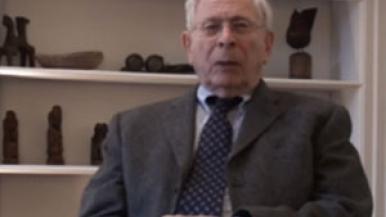Rush psychiatry professor was expert in self psychology and led Institute for Psychoanalysis
Arnold Goldberg, MD, passed away Sept. 24 after a long battle with Lewy body disease. Dr. Goldberg began teaching psychiatry residents at Rush as a visiting professor in 1977 and continued after his appointment as a full professor in 1983 until his retirement in 2013.
Dr. Goldberg was the preeminent interpreter of Dr. Heinz Kohut, a student of Sigmund Freud in pre-war Vienna and founder of self psychology — the theory of a three-part inner self that influences behavior depending on which part is dominant. Dr. Goldberg studied and worked with Kohut, who had emigrated to Chicago, at the Institute for Psychosomatic and Psychiatric Research and Training and at the Chicago Institute for Psychoanalysis. Generations of Rush-trained psychiatrists spent their Friday mornings feasting on doughnuts and coffee while listening to Dr. Goldberg translate, explain and interpret Kohut’s The Analysis of the Self and other great psychoanalytic works.
Dr. Goldberg was not just an interpreter, though. He also was an active thinker and theorist who built on Kohut’s theory, helping to bring it to the forefront of the Chicago Institute for Psychoanalysis’ identification as the center for self psychology and advancement of traditional psychoanalytic understanding. Not only did Dr. Goldberg develop theory, he also worked closely with Michael Franz Basch (father of our own Dr. Gail Basch) and others to refine and advance the technique of psychotherapy.
Dr. Goldberg authored many scholarly publications, books and presentations. He served on numerous editorial boards, was the director of the Institute for Psychoanalysis (now known as the Chicago Psychoanalytic Institute) from 1989 to 1992 and served as president of the Chicago Psychoanalytic Society from 1990 to 1991. He made tremendous contributions to our field and influenced generations of professionals here at Rush, at the Institute for Psychoanalysis and beyond.
I think all of us who trained at Rush during his tenure have favorite memories of Dr. Goldberg. Mine are of the aforementioned Friday morning case conferences, with the rotating schedule for residents to provide pastries (Gail Basch always brought the best!), followed by teaching sessions with senior residents, where we would read Kohut and other important works.
In my era of training, Dr. Goldberg was at his pinnacle, serving as both director of the Institute for Psychoanalysis and president of the Chicago Psychoanalytic Society. He particularly liked to pick on me a bit. After all, he had split hairs years earlier with my father at a psychoanalytic conference discussing the Schreber case, a famous and much- debated instance of multiple mental illnesses. My father had already published An Adlerian View of the Schreber Case, and Dr. Goldberg would publish his interpretation later.
One Friday morning in my third year of training, as another resident presented her case, Dr. Goldberg kept exhorting the group, asking “what is going on here?” I piped up from the back, “well, Dr. Goldberg, the behavior is clearly a compensation for felt inadequacies.” It was what now would be considered a mic drop moment.
“That’s it!” Dr. Goldberg proclaimed and smiled broadly as if some day, just maybe, if I worked very hard, I could join the club of analysts in the know. I didn’t have the heart to tell him that my answer was a core tenet of Dr. Alfred Adler’s theory of individual psychology, which I had learned from my father.
Instead, we both basked in the moment: a communion of souls, teacher showing his student the way to deeper knowledge and understanding of the mysterious ways of the human psyche, to enlightenment. It was magical.
I think it was that way for many of us with Dr. Goldberg. He was incredibly smart and dedicated to teaching. He imbued within us his great reverence for psychoanalytic traditions and history of psychodynamic thought while challenging us to learn and look within ourselves so that we may become skilled healers. He sometimes could be bombastic and acerbic, but he challenged us to think and to learn.
And he was always entertaining. I don’t know if anyone but Dr. Goldberg could have spent three hours on a Friday morning with a group of residents discussing whether we should ever give a patient advice (or not, which was his default position). I think of those Friday mornings often. They are fond memories.
If you are interested in learning more about Dr. Goldberg, I encourage you to watch this 2013 interview with him on YouTube. In it, he reflects on his long career in psychoanalysis, and on the changes in psychoanalysis and psychiatry over the previous 50 years.
It is important to remember those who have gone before us and blazed the trail we now follow. We offer homage to Dr. Goldberg for his teaching, for his teasing (of me and others), for his sharing of knowledge and insights, for his humor, for interpreting Kohut for us and for caring about us so very much.
Dr. Goldberg, thank you for being our teacher.
To Dr. Goldberg’s family, thank you for sharing him with us. It was a precious gift. We hope there is peace and joy at celebrating a life well-lived, even in this time of sadness.
With sincere respect,
Robert Shulman, MD
Acting Chairperson
Department of Psychiatry and Behavioral Sciences
Rush University Medical Center
Goldberg is survived by his wife Constance, children Andrew (Leslie Derkash) and Sarah (Todd Maceira), sister Susan Marks (Michael Green), sister-in-law Annette Grivetti, and grandchildren Max, Alex and Sophie Goldberg and Hunter Maceira. Memorial contributions may be made to the Chicago Psychoanalytic Institute, 122 S. Michigan Ave., Suite 1300, Chicago, IL 60603; or to The Greater Chicago Food Depository, 4100 W. Ann Lurie Place, Chicago, IL 60632. A memorial will be held when such gatherings are possible.

